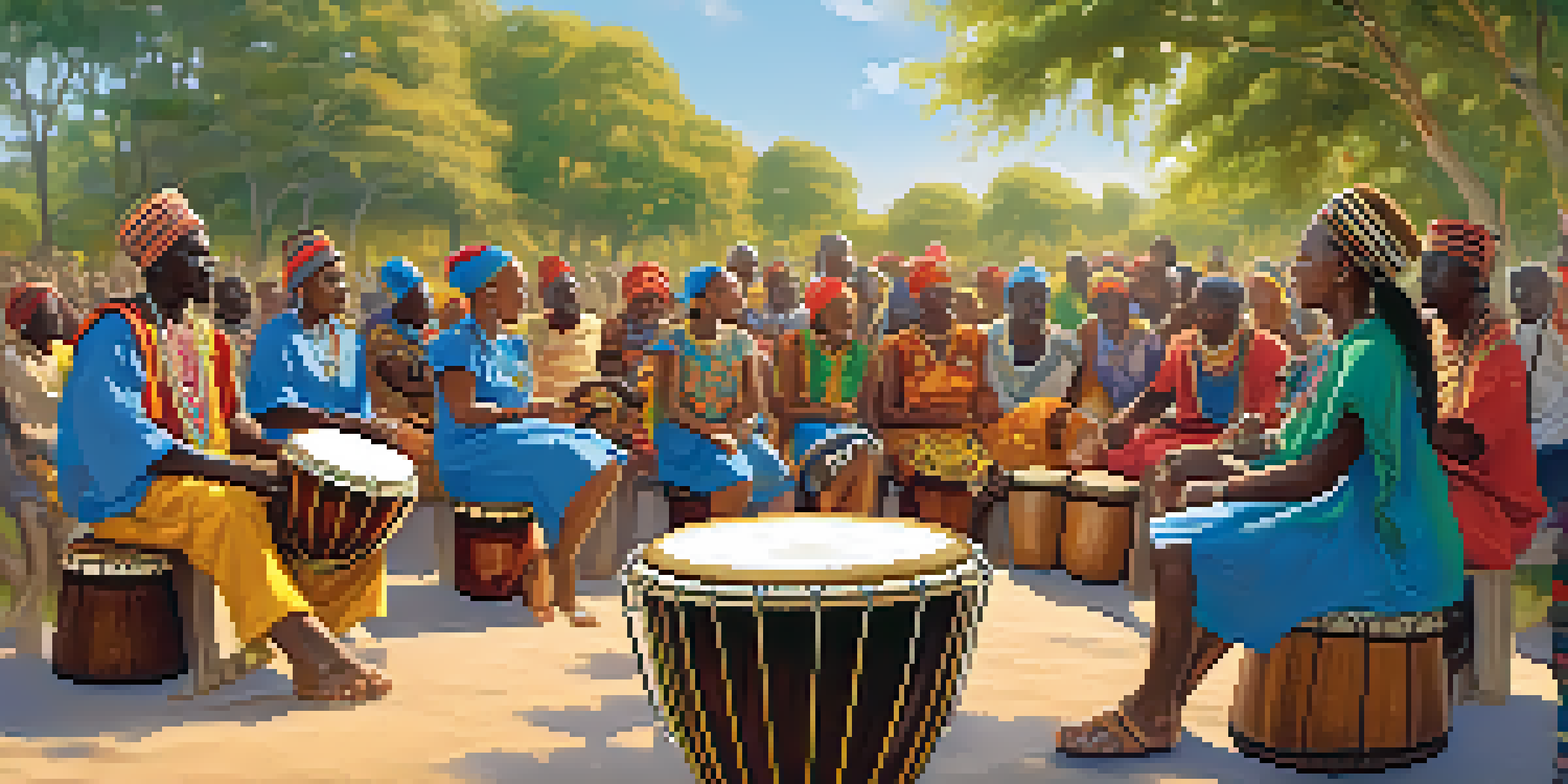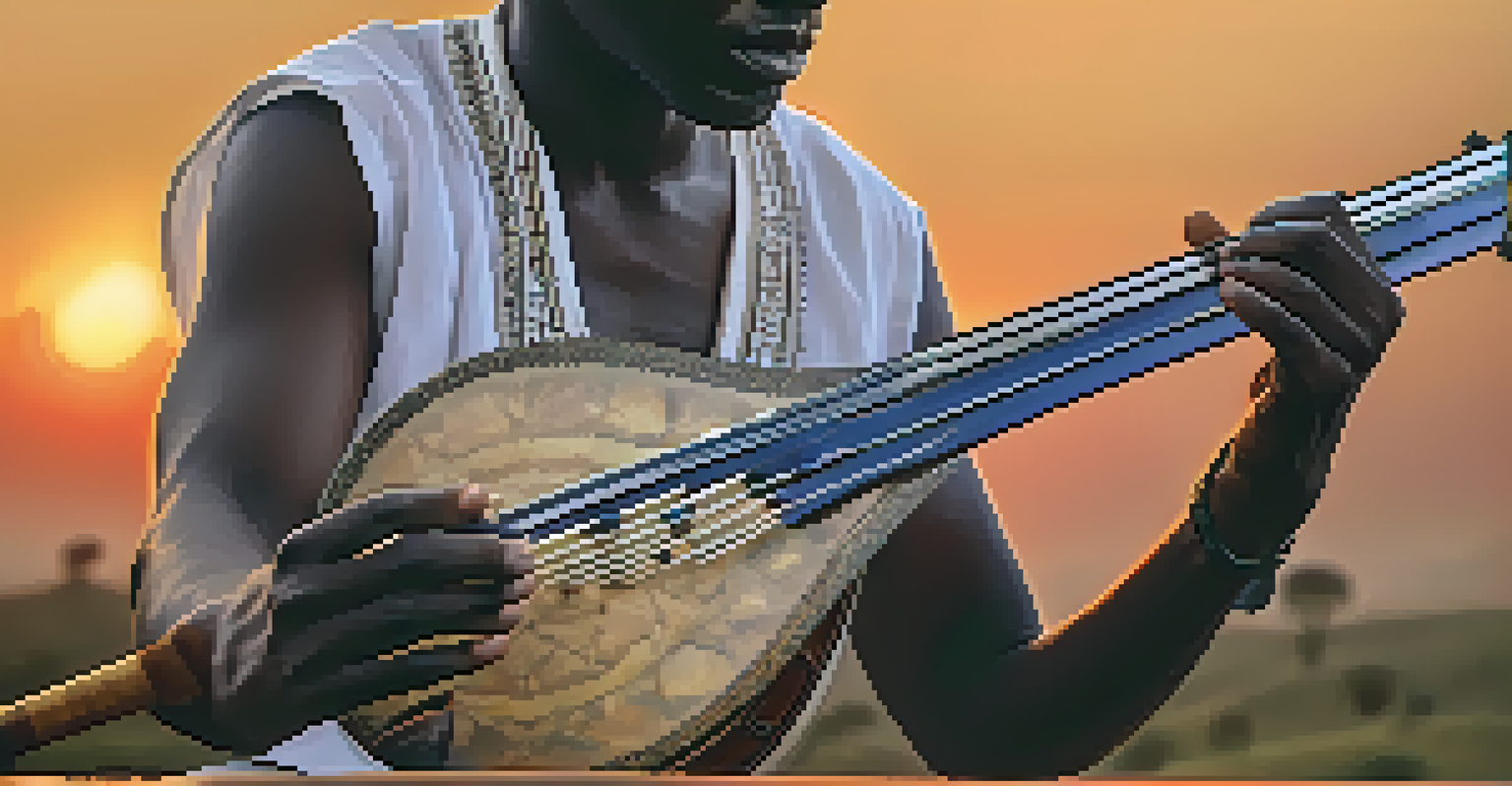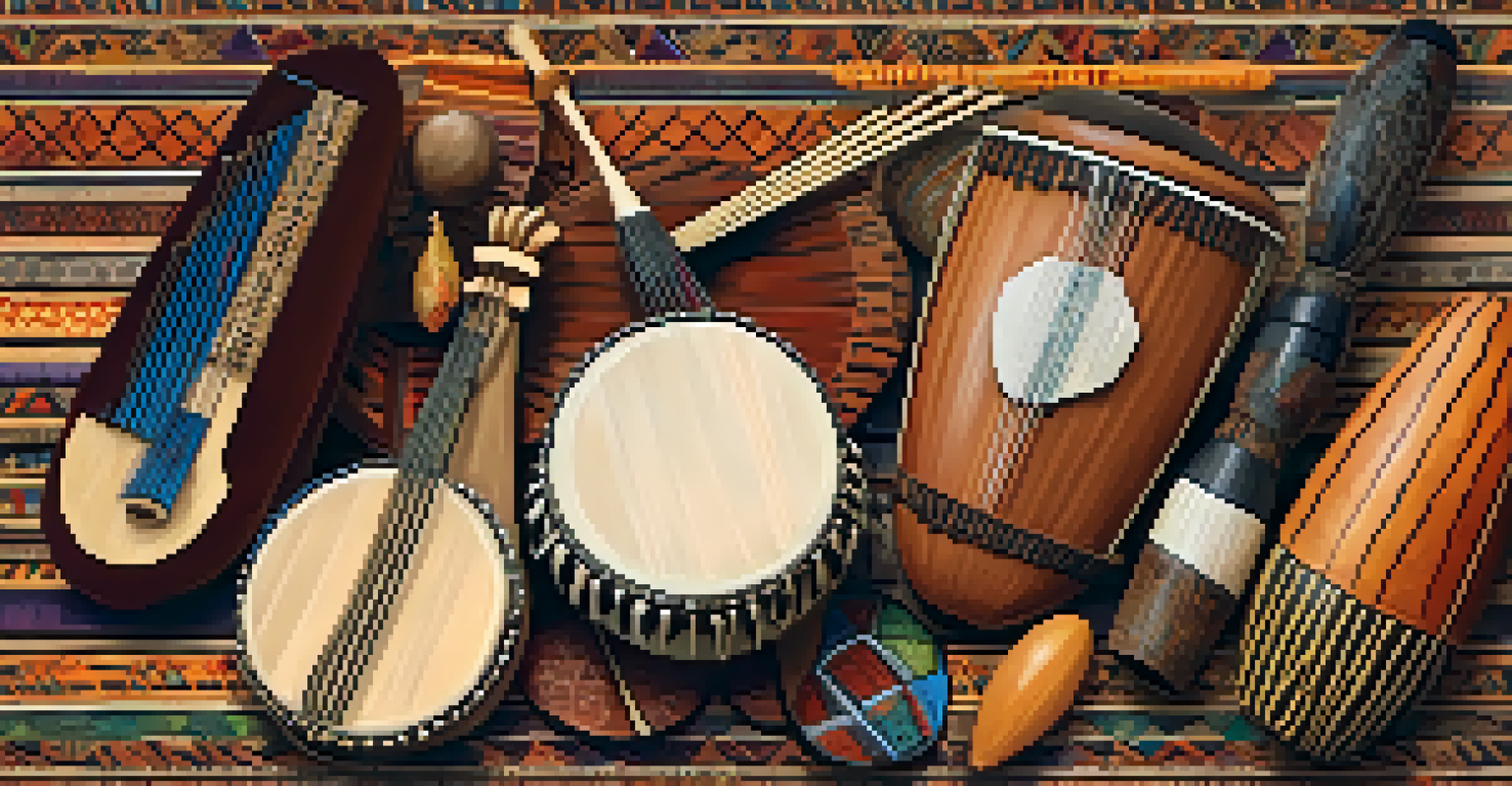The Rhythmic Heartbeat of Africa: Traditional Music Styles

Understanding the Essence of African Traditional Music
African traditional music is more than just sound; it embodies the culture and history of its people. Each region has its unique styles, instruments, and rhythms that reflect local traditions and stories. This music often serves as a means of communication, celebrating life events such as births, weddings, and funerals.
Music is the shorthand of emotion.
The diversity is astounding—ranging from the intricate polyrhythms of West Africa to the melodic chants of East Africa. These styles often incorporate call-and-response patterns, a technique that fosters community participation and connection. It's not just about listening; it's about experiencing music as a communal activity.
In many African communities, music is intertwined with daily life, rituals, and spiritual practices. The heartbeat of the community resonates through these rhythms, making traditional music a vital aspect of identity and heritage.
The Role of Drumming in African Music
Drumming is a cornerstone of African traditional music, serving as a powerful means of expression. Various types of drums, such as the djembe and talking drum, create sounds that can convey messages across vast distances. The rhythms produced are not just beats; they tell stories and evoke emotions.

Communities often gather to perform drumming sessions, where participants of all ages join in. These gatherings can be both celebratory and ceremonial, emphasizing unity and shared experiences. The communal nature of drumming fosters a sense of belonging, reinforcing social ties.
Cultural Significance of Music
African traditional music embodies the culture, history, and communal identity of its people.
Moreover, drumming techniques can vary widely from one region to another, showcasing the rich tapestry of cultural influences. Each drumbeat has a purpose, whether to invite the spirits, celebrate a harvest, or mark an important event, making it an essential aspect of African life.
Melodic Traditions: Instruments of Africa
African music is characterized by a wide array of traditional instruments, each with its unique sound and cultural significance. Instruments like the kora, a stringed instrument from West Africa, create hauntingly beautiful melodies that transport listeners to distant lands. Meanwhile, the mbira, or thumb piano, offers a delicate and soothing sound that is often used in spiritual ceremonies.
The music of Africa is the music of life itself.
These instruments are not just for entertainment; they often play a vital role in storytelling and preserving history. Musicians use them to narrate tales passed down through generations, creating a rich oral tradition. The sounds of these instruments carry the essence of the culture, making them cherished components of community life.
Furthermore, many instruments are handmade, reflecting the craftsmanship and artistic expression of their makers. This connection between the musician and their instrument adds a personal touch to the music, making every performance a unique experience.
Vocal Traditions: Singing and Chanting
Vocalization is another integral aspect of African traditional music, often featuring powerful singing and chanting. These vocals can range from solo performances to large group harmonies that create a rich, layered sound. The use of call-and-response singing encourages active participation, making it a communal experience.
Songs often carry deep meanings, addressing themes such as love, struggle, and celebration. They serve not only as entertainment but also as a means of passing down wisdom and cultural values. In many cases, the lyrics reflect the realities and aspirations of the community, making them relevant and relatable.
Drumming as Community Expression
Drumming serves as a powerful means of expression, fostering unity and shared experiences within communities.
Moreover, vocal techniques can vary greatly, with some regions emphasizing growling or throat singing. This diversity showcases the creativity and adaptability of African musicians, allowing them to express a wide range of emotions and stories through their voices.
Regional Variations: A Journey Through Africa
Africa is a vast continent, and its musical styles are as diverse as its landscapes. In North Africa, for instance, the influence of Arabic music intertwines with traditional sounds, creating unique genres like raï. Meanwhile, in Southern Africa, genres such as mbube and isicathamiya highlight the rich choral traditions of the region.
West Africa boasts vibrant styles like highlife and afrobeats, which blend traditional rhythms with contemporary influences. These genres have gained international popularity, showcasing the global appeal of African music. Each region's distinct sound tells the story of its people and their experiences.
As you travel from one region to another, you'll find that music serves as a unifying force, bridging cultural gaps and connecting people. Traditional music festivals often celebrate these regional variations, allowing artists to collaborate and share their rich musical heritage.
The Impact of Colonialism on African Music
Colonialism had a profound impact on African music, often disrupting traditional practices and introducing new influences. Many indigenous styles were suppressed, leading to a blending of African rhythms with European musical elements. This fusion resulted in the creation of new genres, such as jazz and reggae, which continue to resonate globally today.
Despite these challenges, many African musicians have worked to preserve their traditional music. They often incorporate contemporary sounds while staying true to their roots, creating a dynamic musical landscape. This resilience highlights the importance of cultural identity amid external influences.
Evolution of African Music
Traditional African music is evolving through modern influences, ensuring its relevance and vibrancy for future generations.
Today, artists are reclaiming their heritage and using music as a form of resistance and empowerment. By celebrating traditional styles, they not only honor their ancestors but also inspire future generations to connect with their cultural roots.
The Future of Traditional African Music
As the world becomes increasingly interconnected, traditional African music is experiencing a renaissance. Young musicians are exploring their roots while embracing modern technology and global trends. This fusion of traditional and contemporary styles is breathing new life into the music scene, attracting listeners from diverse backgrounds.
Music festivals and cultural events are celebrating African heritage, providing platforms for emerging artists to showcase their talents. These gatherings foster collaboration and innovation, allowing musicians to experiment and create new sounds that resonate with a global audience.

The future of traditional African music looks promising, as it continues to evolve while maintaining its essence. By embracing both tradition and modernity, artists are ensuring that the rhythmic heartbeat of Africa remains vibrant and relevant for generations to come.